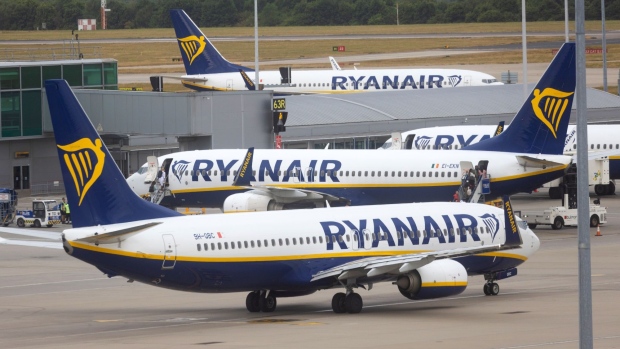Nov 7, 2022
Ryanair Lifts Passenger Target as It Shrugs Off Recession Threat
, Bloomberg News

(Bloomberg) -- Ryanair Holdings Plc lifted its full-year passenger goal and played down the likely impact of a recession on demand, saying bookings are looking strong as far ahead as next summer.
Europe’s biggest discount airline expects to fly 168 million people in the year through March, up from 166.5 million previously, according to a statement Monday. It said earnings should top €1 billion euros ($995 million) as a rebound in travel from the coronavirus crisis shows little sign of abating.
Ryanair said concerns about the impact of slowing economies and higher household bills on its business model have been greatly exaggerated. It predicted people will trade down to the lowest available air fares rather than give up on vacations, comparing itself with cut-price retail brands Aldi and Lidl.
“Christmas looks very strong, next Easter, already next summer looks strong for bookings,” Chief Executive Officer Michael O’Leary said on Bloomberg TV. “What’s unusual is this time I think we’re going into a recession with full employment. People do seem to be spending and they’re certainly traveling.”
Ryanair posted a first-half profit of €1.37 billion following a bumper summer, recovering from a year earlier loss of €48 million. The Dublin-based company said it will offer 10% more seats this winter than pre-Covid, compared with capacity cuts of about 20% at most European Union competitors.
Ryanair rose as much as 42 cents, or 3.4%, to €12.72, reversing early declines in a falling market. The stock has lost about 17% in value this year.
Assuming there are no adverse events, such as a resurgence in the pandemic, the airline said that should generate full-year earnings in a range of €1 billion to €1.2 billion, before exceptional items.
While O’Leary expressed confidence in the demand outlook, he said he’s less sure about the ability of Boeing Co. to deliver the 51 737 Max jets due for next summer as supplier snags hold up deliveries.
“I’m concerned,” he said. “There’s real doubt about whether we’ll get the last five or 10 of those aircraft in time for the June-July-August peak. We really won’t know until February or March.”
O’Leary said Ryanair is hedged on aircraft purchases, which are made in dollars, at $1.24 to the euro, reducing the impact of the European currency’s recent depreciation.
The company plans to pay down €1.6 billion of debt that’s maturing in the next 18 months from its “very strong cash flows,” Chief Financial Officer Neil Sorahan said in a phone interview.
(Updates with stock performance in sixth paragraph.)
©2022 Bloomberg L.P.


